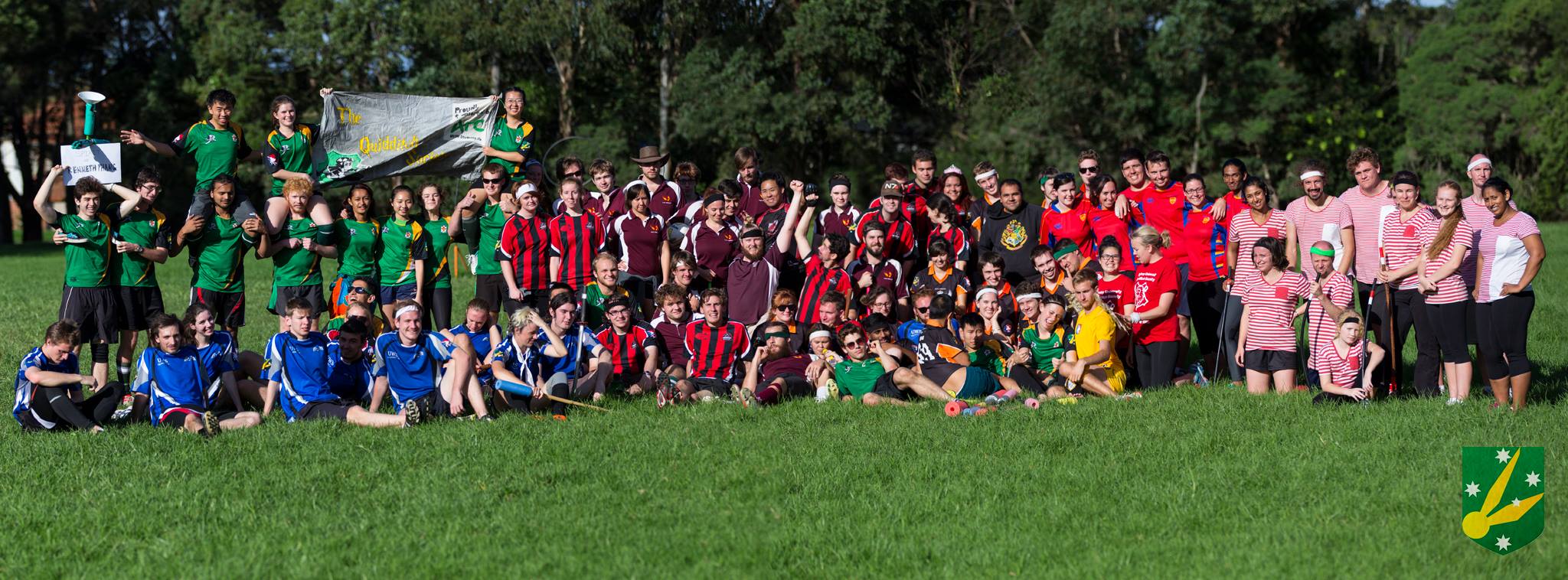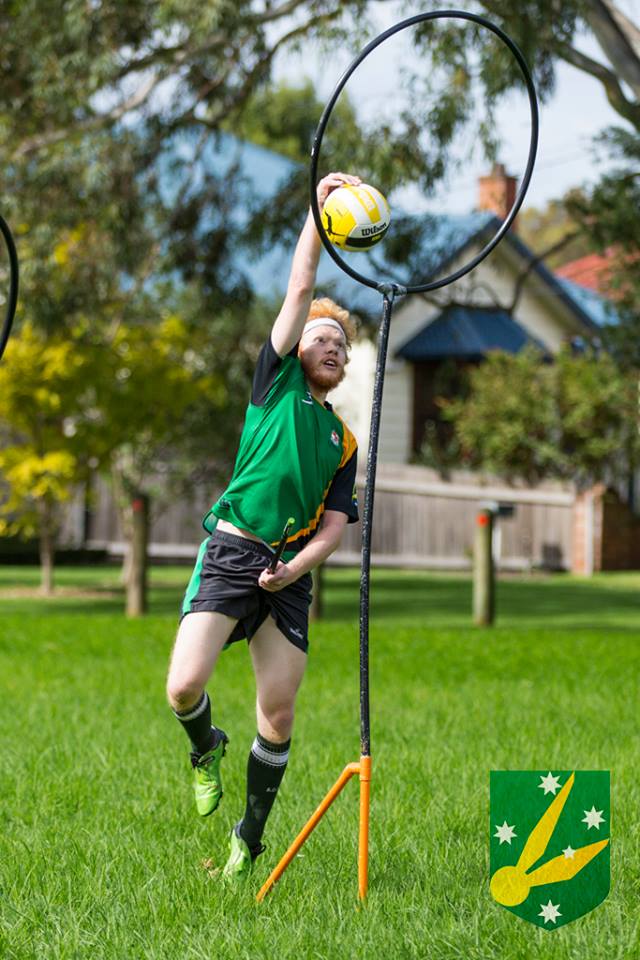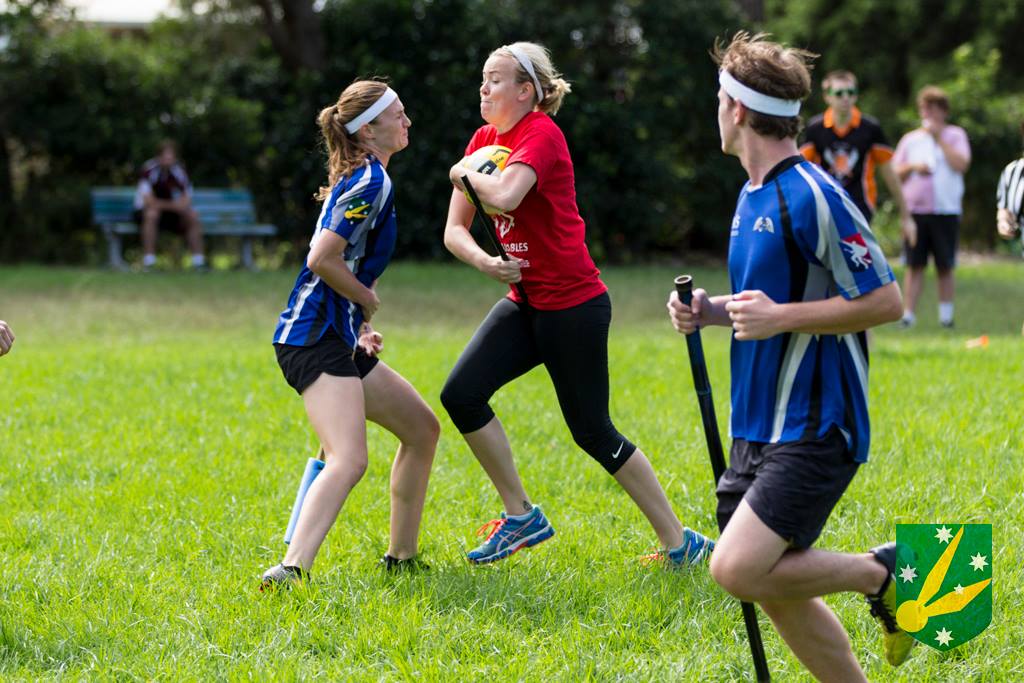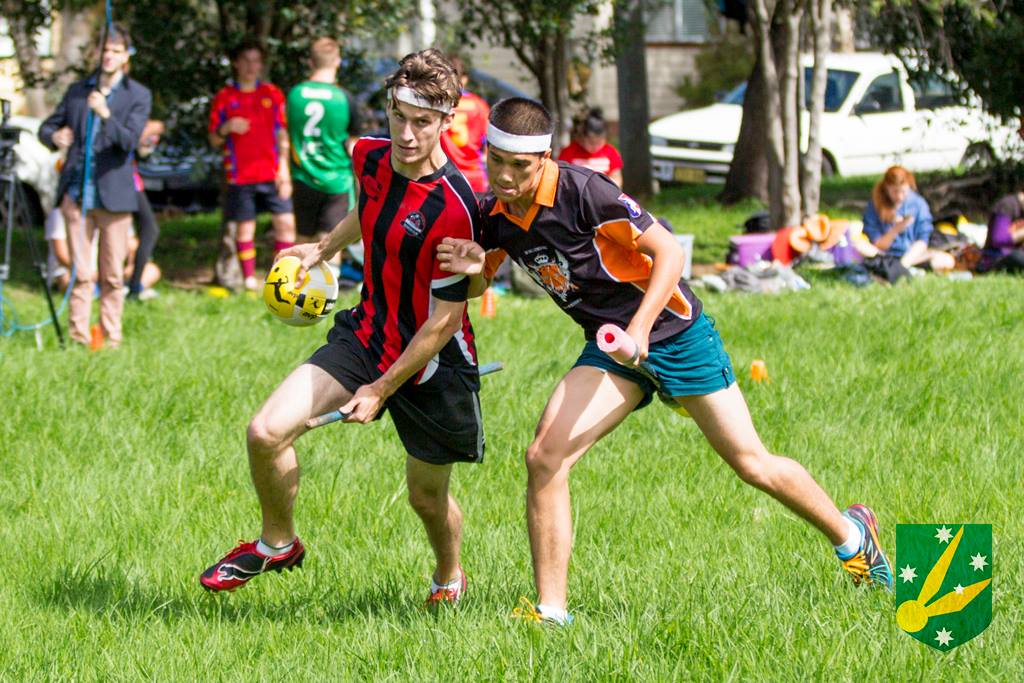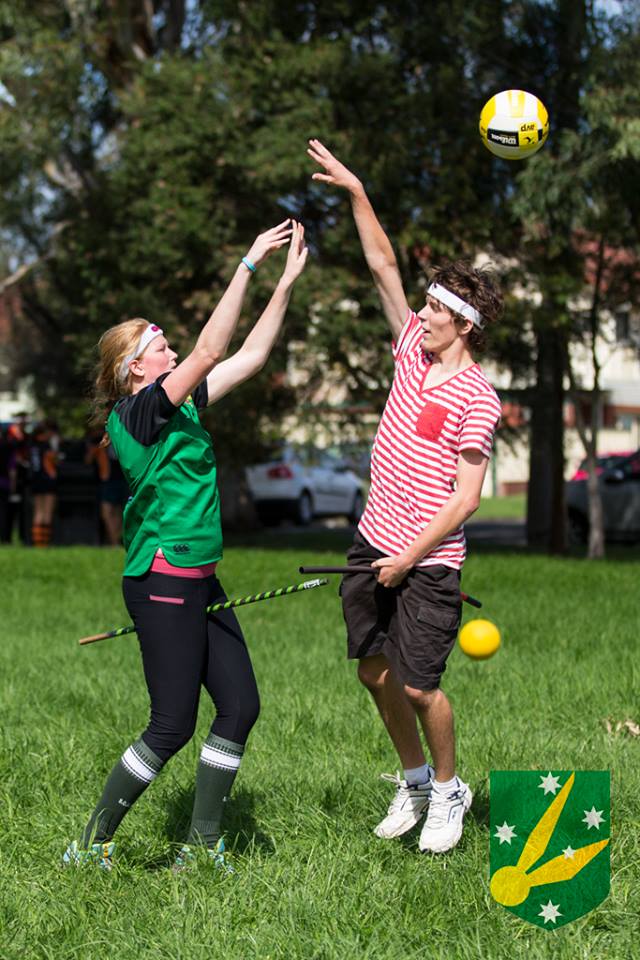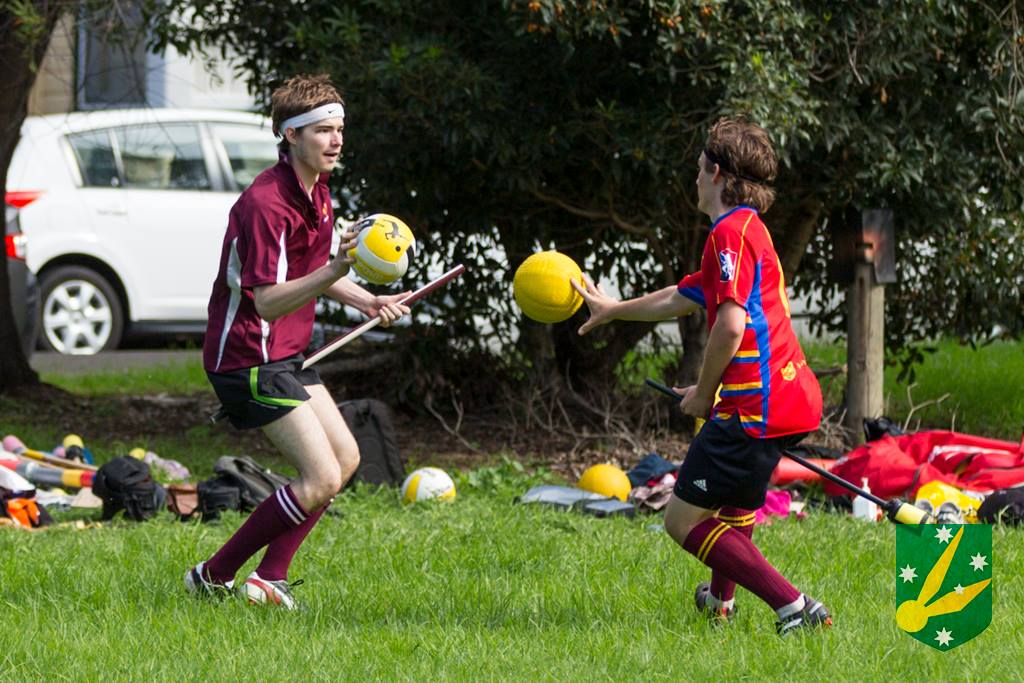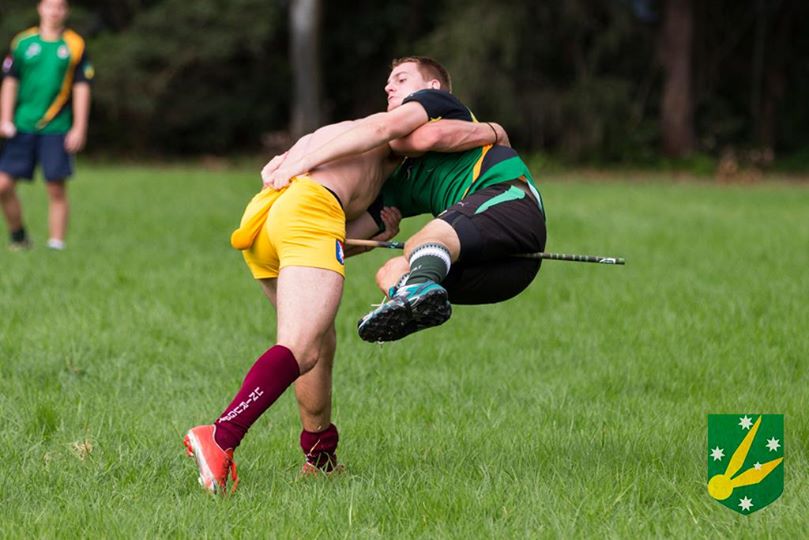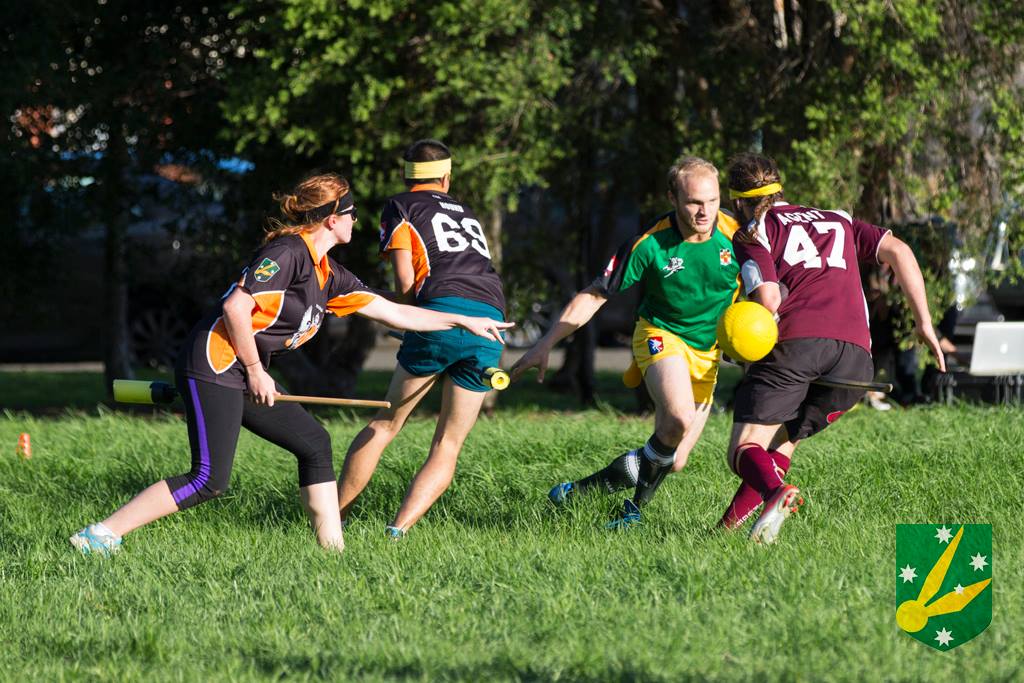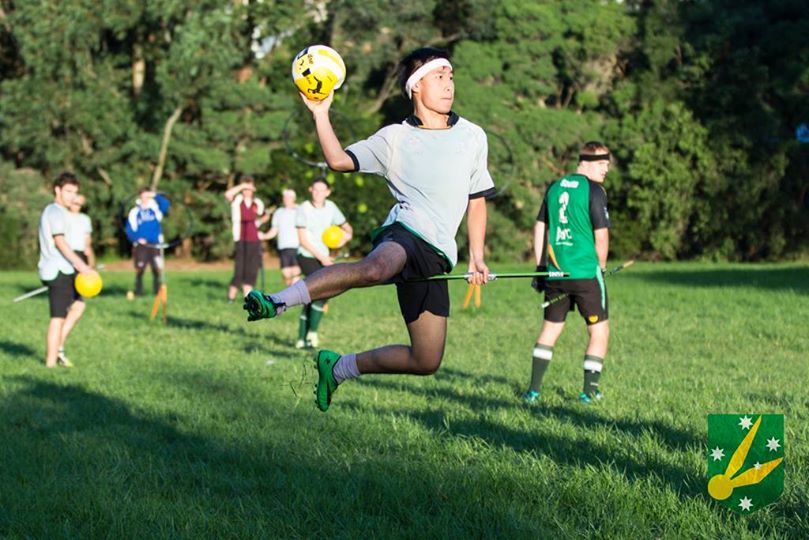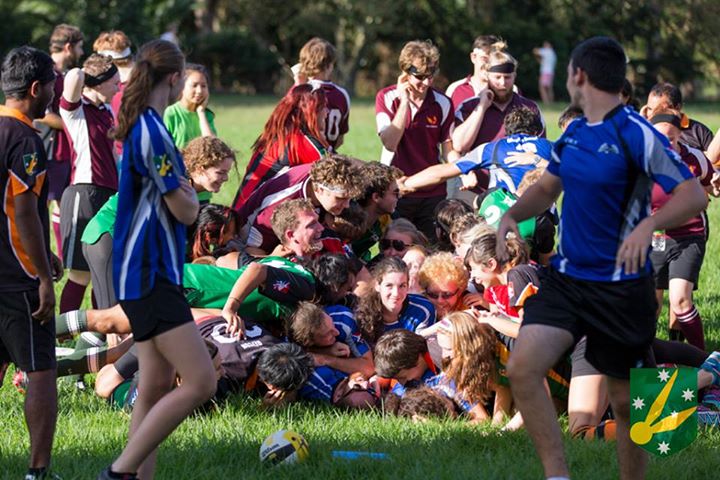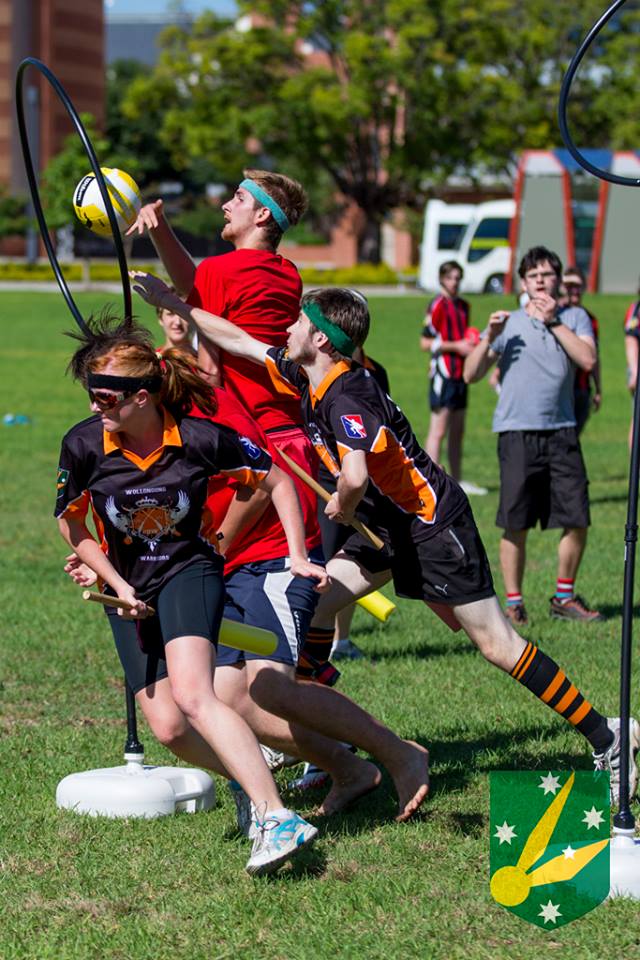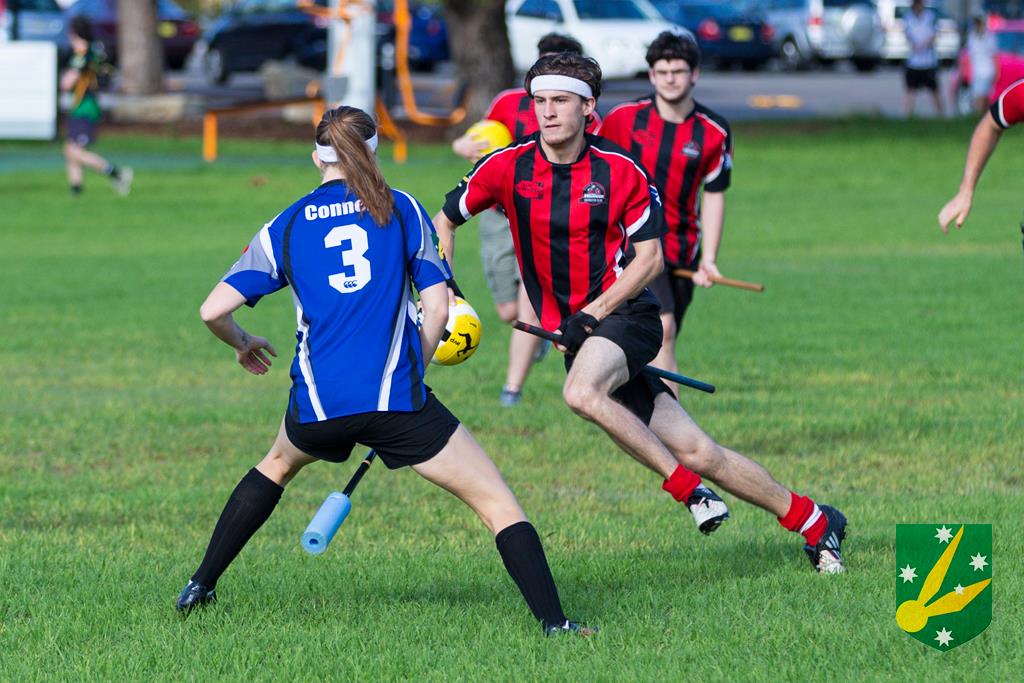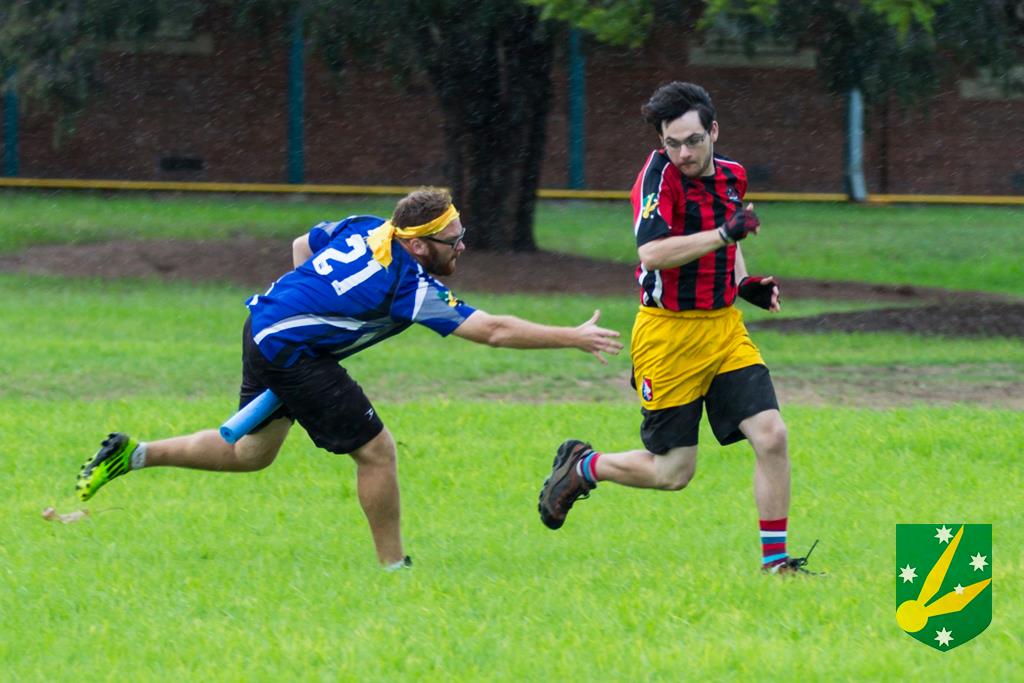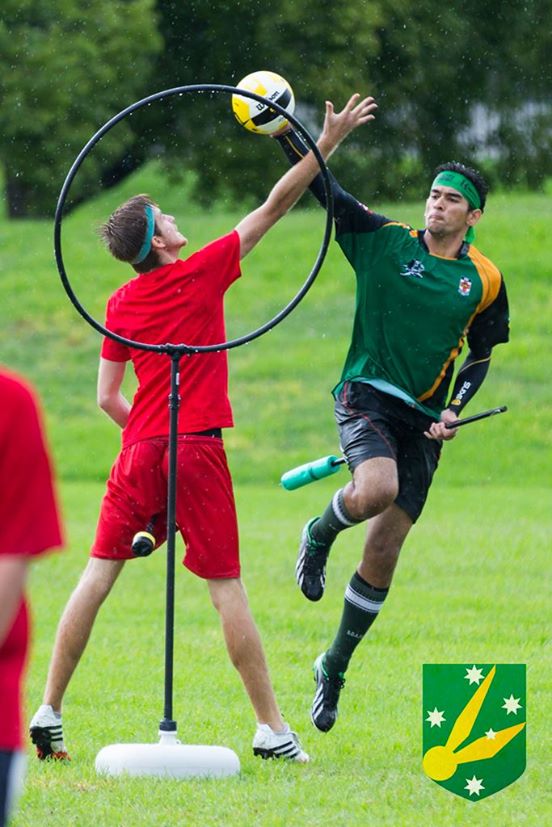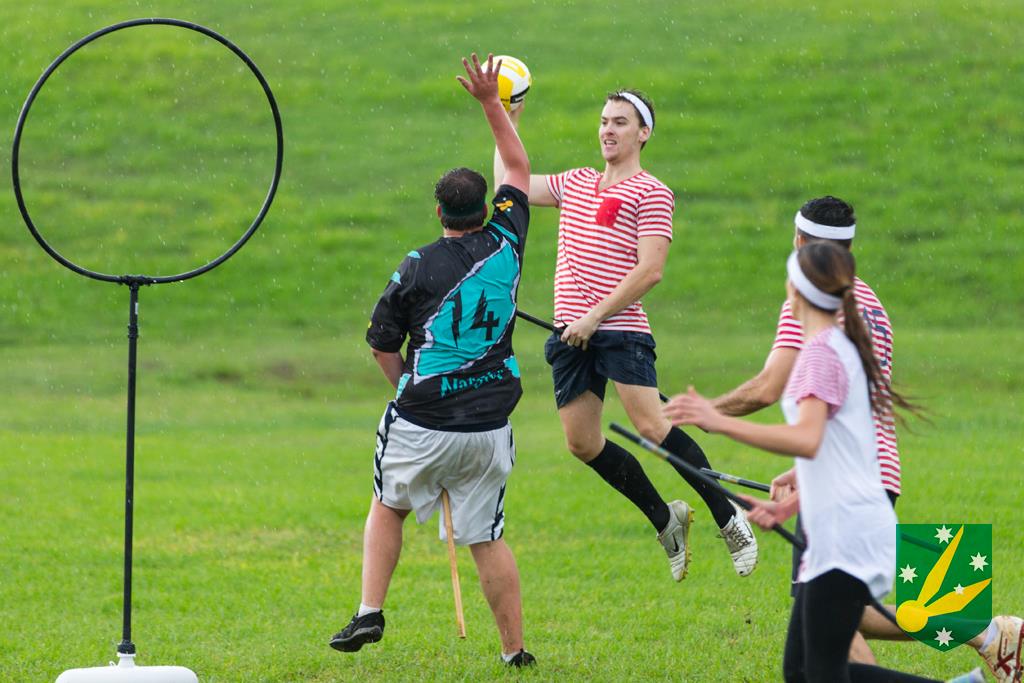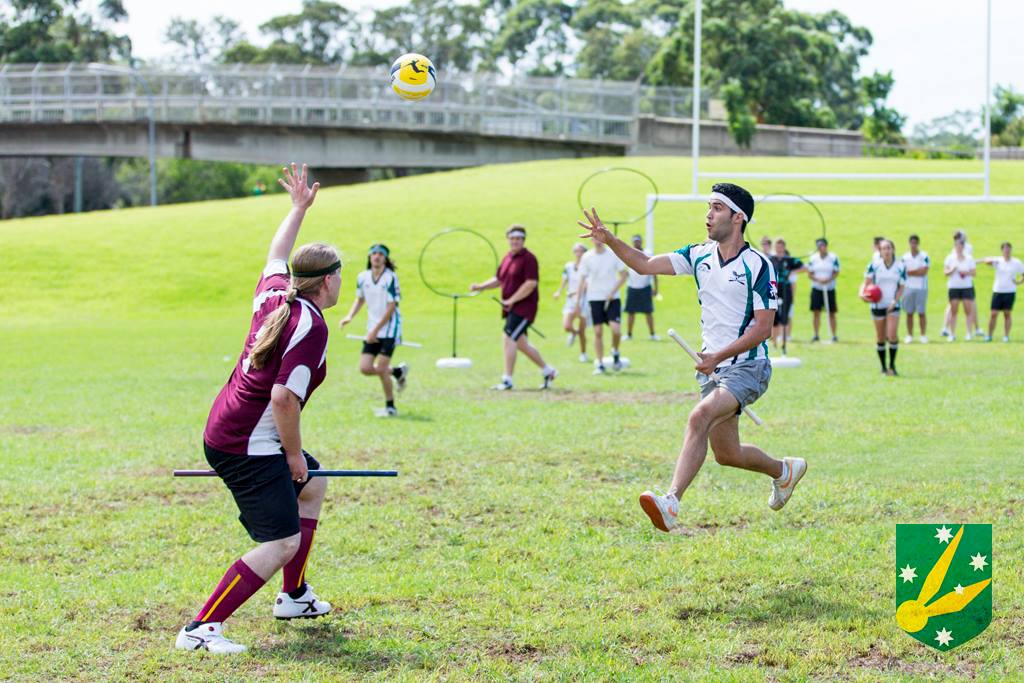But without further ado, the AQA is pleased to announce the QUAFL 2015 will be hosted by the Monash Muggles and the Victorian Quidditch Association at Monash University’s Clayton Campus. QUAFL 2015 will be held on the weekend of the 5th of December.
The organizing team will comprise of Eva Alexandra as tournament director with Nicola Gertler and Emma Morris as Assistant Tournament Directors to aid in organizing on the ground logistics. Members of the community that the team feel appropriate to aid in the organization of QUAFL 2015 will be personally contacted in the following weeks.
See you in Melbourne!
]]>
The Board is proud to announce the appointment of two new director; Maria Wizbicki from the Macquarie Marauders and James Mortenson of the Newcastle Fireballs. Maria is no stranger to the board having been an executive in 2014. She will continue on her work with the AQA’s marketing portfolio. James, as a certified head referee and a training coordinator for the IRDP has proposed a new referee training initiative. I’m sure we are all looking forward to see what these two can bring this year.
On a second note, the staff position of Director of Membership Services has since been absorbed and the responsibilities will be undertaken by Hannah Monty as Vice President and Emma Morris as Treasurer, effective immediately. We would like to thank Luke Derrick for his time and contribution in his role as Director of Membership Services during a year of many changes.
]]>
Half Year Membership: $30pp
Teams who have new players they would like to add to their rosters for upcoming events, please get your team representatives to get in contact with the executives.
]]>
- Appointed Director
Following the casual vacancy left during the recent AGM, the current Board of Directors have decided that the best course in filling the aforementioned casual vacancy would be to appoint a director as opposed to electing one.
Luke Nickholds will be posting up a separate call out soon so keep a lookout for that if you’re interestedin joining the board.
- AQA Expansion Grant
Now that the AQA are more financially secure, we have decided to make grants available to all quidditch teams and state associations in Australia. We have set aside a total of $1000.
This grant is not limited to official member teams. The AQA are of the opinion that teams who are not yet established and currently unofficial should be given the opportunity to apply for this grant as they are in need of more help than established teams.
Teams who are interested in a share of this grant should apply to [email protected] with why they are in need of thegrant, how they would be using this grant to aid in expansion and a total amount required. Once approved, teams will also be required to show proof of purchases when using the grant money for expansion purposes. Applications open now and the due date for applications is the 13th of February 2016.
After this, the AQA will continue to accept and consider any further grant applications as they are submitted. Please be aware that the grant budget is a total figure and not a per application limit.
- QUAFL 2015
With QUAFL next year, we would like to give the organizing committee more time to get sorted and teams that need to travel more time to save up and make travel plans. As such, the QUAFL bid package will be released on the 5th of January 2015 and will close on the 16th of February 2015. The location for QUAFL 2015 will be announced on the 23rd of February 2015.
- Policies
Hannah has prepared a few policies for the AQA to coincide with the requirements of the Australian Sports Commissions to be formally recognized as a nationally sporting organization. These policies cover matters such as anti-doping, elections, governance and member protection. They are currently still being read and approved by the board and will be released to team representatives in the coming week.
- Events Calendar
An events calendar has been tried before but we will be organizing another one this year. This project will be headed by Arfy Papadam and will include important due dates as well as upcoming events. Team Representatives should email [email protected] if they have an event they would like to be added to the calendar. This calendar will be available on our website at www.quidditch.info
]]>
The existing directors and representatives of teams across Australia forsook watching Doctor Who. A pitched battle against tardiness, and technical problems was bravely fought. Good triumphed evil and our new directors were elected.
The AQA is happy to announce that its board of directors have gained the talents of Arfy Papadam, James Hosford, and Maria Wizbicki.
Arfy Papadam is the founder of the MacArthur Weasleys, as well as the man who brought us the wonder that is Wheelchair Quidditch. He officially plays for the University of Western Sydney Thestrals. Arfy has experience in advertising and events and will be taking on our events portfolio. He will be our main liaison for all AQA sanctioned events and will also put in a hand with external relations.
Maria Wizbicki is currently the director of marketing and the president ofthe Macquarie Marauders. As director of marketing, she rebooted our social media efforts and had a hand in our hugely successful fundraising campaign to send Team Australia to Canada. She is also the assistant tournament director for QUAFL 2014, to be hosted at Macquarie University. Maria will continue onwith the marketing portfolio as executive director.
James Hosford has been with the AQA from the very beginning as founding gameplay director and is known for being the Tournament Director for various events including the most recent QUAFL Cup and is also Tournament Director for the upcoming QUAFL Cup. He has worked extensively in statistical archiving and was at the helm of organizing our lovable Drop Bears to travel to Canada for Global Games, where they came home with the silver medal. James will continue on with the gameplay portfolio as executive director.
Please join us in welcoming Arfy, Maria and James. We look forward to working with them and all the wonderful things that will come from the new board of directors.
]]>World Cup buzz was the order of the day. World quidditch’s great and mystical centrepiece had been run and won just a week previously, complete with magnificently boisterous representation from the University of Sydney Unspeakables, who were the first Australian club to make the journey. Australia’s ambassador team returned seasoned and hardened. Her ambassador snitch returned freshly glorified and unionised, resplendent with American solutions to the conveniently prescient problem of difficult snitch boundaries. The surrounding border of public road and private housing lining the field ensured that off-pitch seeking this month was out of the question. The complexion of the day was therefore changed as each snitch camped inside the hard boundary awaiting the sudden madness of a seventeen minute seeker release.
This created a day of slightly shorter games on average, but such a trend was surely perversely welcome to the Wollongong Warriors in their first match of the day. Chris Rock’s first snitch catch of the season, emphasizing the demoralising depth the Snapes have even in this most specialised position, mercifully ended a 170-0 thrashing before the score could get worse. A bigger margin would not have befitted the efforts of the Warriors. Much like Sydney and Macquarie in March and one suspects much like more teams later on this season, Wollongong were perfectly adequate in their general performance but just not able to stay with the UNSW juggernaut.
Minh Diep and Phil Vankerkoerle started together on this occasion, with Andrew Culf kept on ice. Diep scored in the opening minute, but play was otherwise slow and slippery in the early exchanges. The dew-heavy long grass of the pitch clearly affected the handling of both teams. Perceptions were perhaps amplified by unfair comparisons to recent select World Cup viewings that were fresh in the memory, but even by usual Triwizard standards, play was clearly proceeding turgidly.
Vankerkoerle provided much of the necessary spark, scoring twice early and having a hand in other goals as UNSW took control of the match. By the ten minute mark their lead was 70-0. With the result reasonably secure and their flowing rhythm back, the Snape train began to roll through the madly defending Warriors’ solid structure. By the time Rock caught the snitch, fourteen goals had been managed, with Minh Diep just taking the scoring honours with five goals.
As if UNSW’s dominance in depth wasn’t already clear enough, they annihilated any doubts by comprehensively sweeping aside a quality team, largely without requiring the services of their star chaser Andrew Culf, who barely featured and was not to be found on the scoresheet. The hosts would turn around in an hour’s time for the second ranked game of the day as well, against the Macquarie Marauders. But before then, two games of very different competitive quality were to be had.
The Macarthur Weasleys, albeit highly depleted, nevertheless brought a team to compete for a second time. First they would face the Newcastle Fireballs, who were also present in March but in decidedly smaller numbers. Later contests today would see the restocked Fireballs play ranked for the first time this season. This first match would be an acid test of their very new look line-up, to see how untried figures likes James Putin, Bryson Davey and Liam Dawson would go gelling with trusty old hands in funky new arrangements under the untested leadership of new captain Joshua Naismith.
So much was new for this match on both ends of the pitch, but familiar faces dominated play. Captain Arfy Papadam ran play for his Weasleys as always, with special guest Morgyn Benstead expertly keeping the beater contest alive and even. Newcastle were never under threat though, with captain Naismith, anchor Roy Velting and marquee man Dameon Osborn all calmly using their experience and power to comfortably execute, leading the Fireballs to a 140-10 win.
Following this though, was a high quality tight tussle between UWS and Sydney, unranked only due to the understandable Unspeakable shortages in the wake of having only returned from across the seas in recent days.
Captain Luke Derrick and star chaser Cameron Brown were present however, with Brown’s early goal matching Corey Ingold-Dawes’ first minute effort. Sydney’s beater unit announced themselves at QUAFL 2013 and made waves in America where they impressed many, so by now they were in their element, able to just about stay with any beater pairing.
Ingold-Dawes was proving to be the early X-factor, with his hat-trick establishing a 30-10 lead. Captain Hannah Monty, as she so often does, slowly played her way into the match, taking control in the middle stages as UWS crept away with goals to Monty, Daniel Ormshaw and Juan Demin. Sydney were never far away though, with their three goals keeping the match tenuously alive at 60-30 by the lifting of the seeker floor. UWS deserved the win though and were duly assured it by Christian Barquin’s catch.
Last time quidditch was here in Wollongong, the Warriors’ rivalry with the Macquarie Marauders was just heating up. Wollongong’s Midwinter triumph was fresh in the memory and both teams struggled at a September Triwizard dominated by the UNSW and UWS powerhouses that made up the four team line-up. In a thrilling battle for pride, victory came down to the snitch, so it was perhaps a vague surprise that the always snatchtastic Warriors came up short. This match-winning catch for Macquarie definitively marked the arrival of Daniel Commander, who before September was known as a relatively undemonstrative relief chaser, but went home as the country’s new seeking prodigy. By QUAFL he was arguably the best of all nationwide, leading the Marauders to within inches of ultimate glory.
But here Macquarie were without Commander for the first time since then. So further Daniels took up the slack of maintaining the name’s quidditch pride. Daniel Lowe and Daniel Claxton dominated their respective sides of the scoresheet, each scoring three times in a pair of frenetic chaser performances as evenly matched as the rest of their teams were across the board. Claxton took only forty eight seconds to put Macquarie on the board. Less than a minute later Lowe had equalised. A bit later on Claxton scored again, so Lowe saw fit to reply less than sixty seconds subsequently once more. But the intervening five minutes were a roller-coaster, with both teams’ chaser units finding space in centre-field but being unable to quite execute at the finish.
When Lowe completed his hat-trick, Wollongong were 30-20 up and luck seemed to be on their side as further missed and disallowed opportunities passed the Marauders by. It was a faster and more back and forth neck-turner of a match than the score suggested. Both teams’ beater strength lay in their last line defence, with Hannah Davidson and Morgan Thorndyke both immovable at the goal face.
Macquarie’s depth began to shine through but they continued to waste chances, aided by some adept adroitness in goal from Brandon Heldt. Wollongong captain Jacob Fleming broke the Danielopoly in the fourteenth minute, taking Wollongong twenty clear, but Claxton hit back for both Team Daniel and Team Marauder quickly afterwards. A quick follow-up from Scott Palmer tied the match, which remained at 40-40 as the seekers took flight.
Dan Phipps then threw a spanner in the works, throwing his own name into the ring of Daniel. Phipps gave Macquarie their first lead of the match and Team Daniel their biggest, 70-20 over the mortals of humanity.
Then a Daniel caught the snitch. It was long clear that the final snatch would decide the meaningful Macquarie vs Wollongong portion of the contest. So the big question was which Daniel had smeared themselves in glory. It wasn’t Commander, absent as he was. It wasn’t Lowe this time, as it so often is. It was, more unusually, the Daniel of the Claxton variety.
It was the Marauders who won therefore, 80-40 over the continually luckless Warriors in a tense but frustrating match which both teams had ample opportunity to put to bed early but couldn’t.
Before UWS and Newcastle prepared to face off for the first time this year it was time for the Weasleys to front up, hoping to give UNSW any kind of substantial workout. The Snapes, with fresh troops at their disposal and a ranked clash against a more confident Marauders still to come, relied on many of their ‘second string’ players (ala some of the best players in the country) to blow the Weasleys away.
Macarthur, with further personnel at their disposal since their early morning game, showed greater attacking flair, with Sam Legeret in particular penetrating deep into the Snape keeper zone in wily support of Arfy Papadam’s anchoring runs. With the result well and truly clear and the snitch nearly caught, the Weasleys to their credit manage to do what not even the experienced and polished Warriors unit could do and put a goal through the UNSW hoops. But this would be their sole triumph in a gallant 130-10 loss.
For the Newcastle Fireballs, it was finally D-Day. Newcastle’s first ranked match of the season pitted them against UWS, the bogey team who had caused the Fireballs their greatest problems consistently throughout 2013. But this was a fresh and revitalised Newcastle unit. It was the most immediately impressive of these rookies who opened the scoring, James Putin establishing an early Newcastle lead which Dameon Osborn quickly doubled. Daniel Ormshaw’s attempt at a quick restart was scuttled by the attentions of Putin, who promptly earned a yellow inside the first three minutes of his official career for not retreating from the keeper zone.
Bianca Connell utilised the extra space of the seven-on-six advantage to hit back, before Dom Bell crucially freed Newcastle of what had until then been total beater dominance from the beleaguering Tom Russell and the unswerving Kalinda Gibson. With bludger control emphatically secured, the momentum shifted towards UWS, who wasted no time in taking the lead through consecutive goals to Corey Ingold-Dawes and Hannah Monty.
Newcastle’s improved chaser depth consistently put UWS under pressure, but the Thestrals’ beater dominance was too thorough, allowing them to dictate play and slowly draw away.
Ingold-Dawes and Connell both added a second, before Juan Demin continued to display the added effectiveness of UWS’ new generation, taking the margin beyond snitch danger. It was Newcastle’s new captain Joshua Naismith who ruthlessly snapped the snitch, just seconds after being released to pursue it. But the game was already out of reach, as he recognised in haring straight after the tag rather than consciously defending. With Newcastle’s catch, UWS settled for a 70-50 victory but one which after the opening few minutes never looked in any doubt.
Newcastle’s season had started promisingly in patches, but more would be needed if they were to overcome the Unspeakables, who pushed UWS far closer in their earlier match. However Luke Derrick had sustained a hand injury in that defeat, ruling him out for the remainder of the day. This presented a clear opportunity for the Fireballs to take advantage of a team whose balance changes completely without its inspirational leader. However Sydney countered smartly, shifting Cameron Brown to beat with Paul Harrison, who was already ably covering for the absent Rob Wells.
With Brown occupied beating and Patrick Ward still in the States after his world cup sojourn, Newcastle should have had the superior chaser firepower to overrun the Unspeakables. Certainly the lack of penetration hindered Sydney early on and they led only 10-0 after five minutes dominated by a tight beater tussle. The power balance with the quaffle was then redressed when James Putin was controversially sent off for an un-malicious albeit extremely clumsy tackle, ending up both high and behind.
Still, Newcastle only needed to stay within thirty shortly, as seeker Liam O’Callaghan was yet another absentee for Sydney. But even that was proving difficult. The astuteness of shifting Brown to beat became clear as time passed. His dominant athleticism was such that despite his relative inexperience in the role, his combination with Harrison was once again sufficient to deprive the struggling Newcastle beaters of possession. With their beaters’ total bludger control affording them the room to move, Sydney’s rotating roster of experienced and heartily solid chasers, led by Belinda Toohey and Ajantha Abey, made wily progress on the scoreboard.
The Fireballs could only score once as Sydney drew safely clear, then sealed a striking 90-10 win when Isabella Moore pounced on the snitch, ably covering in O’Callaghan’s absence.
For the second straight month, UNSW and Macquarie clashed. Macquarie entered this match full of confidence having professionally worn down the potent Warrior threat in their tight victory. But Andrew Culf’s quiet day had been building to now. He proceeded to score a goal per minute over the first five, unanswered by either opposition of team-mate. 50-0 was a decisive and confidence sapping start for Macquarie.
The Marauder beaters are always competitive in the bludger contest, especially with their full quality quota available. The rotating pair of hulking keepers Dan Phipps and Scott Palmer provided strength from the back, feeding Daniel Claxton’s direct and efficient charges. But without the consistent firepower across the field that characterises a chaser unit like UNSW’s, the Marauder attack lacked a certain variety and therefore was increasingly easy for UNSW to structure a defence against and easily pick off.
Quaffle possession was even more evenly shared this time around than it had been in March, with the Marauders attacking just as effectively from their own half as the Snapes were. But just as against Wollongong, they could not find a way to break through the last line and efficiently finish. 50-0 had become 80-0 by the ten minute mark, before Laura Bailey finally scored only the second goal against UNSW in 45 minutes of quidditch for the day. It came in an appropriately unlikely way. With the firm Snape defence pinning Bailey in her own half, this particular play was a lost cause for the Marauder captain who was left no option but to fire a looping lob towards the powerlessly covered Claxton at the hoops. But the quaffle happened to descend straight through the middle hoop and Macquarie were suddenly on the board.
Andrew Culf continued on his merry way to seven goals for the match, but the pace of UNSW’s procession slowed significantly. Play continued beyond the half an hour mark thanks to snitch Dameon Osborn’s inevitable monstering of his hapless seekers. The second half of the match was characterised by a marked tactical shift from the struggling Marauders. Unable to control the Snapes’ march towards another belting, Macquarie shut up shop completely, slowing the game to a crawl by holding onto the quaffle for long periods inside their own half. UNSW’s ever professional beaters refused to break formation and force the play, preferring to let Macquarie sit on their heels safe in the knowledge that their defensive structure was set and ready for anything that might eventually come up at them.
To their credit though, the Marauders shook things up and the tactics can be said to have succeeded to some extent, as Bailey managed a second goal of her own and Phipps added a third. Meanwhile, UNSW were only able to score five goals over the last fifteen minutes of match, thanks largely to Minh Diep’s late surge towards a match tally of five for himself. But the match was already lost in the early stages, leaving lingering questions of how next time might go if Macquarie play that way straight from brooms up.
At long last, Osborn was bested, when Nick Allan spectacularly vaulted over the snitch’s shoulder and snagged the tag from above, finalising a 180-30 win for the peerless Snapes.
The third game of the Weasleys’ day was against UWS, completing a cruel trilogy of fiery quidditch indoctrination at the hands of an improved and physically powerful Newcastle, the No.1 ranked UNSW, and their great No.2 rivals UWS. But this was a day of learning for the rookie team and there is no better learning experience than coming face to face with the best of the best. UWS were not exactly the best of their best here though, utilising what is these days the rare opportunity to face a definitively weak opposition. Many usual positions shifted, led by captain Monty who took up the mantle of beating. Fellow beater Dom Bell also had the distinction of scoring a goal, when Ingold-Dawes broke clear with no Weasley keeper at home, allowing him time to toss the quaffle up in front of the hoop for Bell to propel a bludger at.
It was all a bit mad-cap for UWS as they proceeded to effortlessly dismantle their opponents, with the relaxed Thestrals making room for the Weasleys to have a bit of fun, or disrespecting them entirely with their antics, depending on your perspective. But no one could deny that the match was an enjoyable lark to behold and UWS still did their work efficiently, winning 180-20. It was Chrystal Player who finished the match by spectacularly surprising all, herself more than anyone, with a first ever snitch catch.
With the vaudevillian diversion over and done with, it was serious business time again. The last ranked match of the day saw the hosts take on the Newcastle Fireballs, the great old rivals finally meeting at long last, for the first time since Midwinter. Wollongong have come a long way since then, kicked off by their breakthrough efforts that weekend in Newcastle. The Fireballs, though impressive in reaching the QUAFL semi-finals, have nevertheless come rather back to the pack. Clashes between Newcastle and Wollongong have historically been one-sided, with a narrowest margin of sixty and an average score of 145-29 over eight perfect wins from eight for the Fireballs. But it was clearly not going to be the same story today, with these teams now evenly matched in most areas.
Captain Naismith led from the front, opening the scoring after two minutes. But it was the Warriors who controlled the early moments, with Brandon Heldt then Daniel Lowe scoring. Lowe added a second after six minutes and it was 30-10 to Wollongong and a momentous upset (in a historical context at least) was brewing.
Hannah Davidson and Aman Nalli were immense, controlling the Newcastle beaters and providing the backbone to allow their chasers early supremacy. But the chaser firepower of the Fireballs was superior and they slowly took control. The Fireballs had quaffle control and looked the clearly better team, but their finishing was poor, with the Warriors consistently better at the goal mouth. In fact, everything felt distinctly similar to the Macquarie vs Wollongong morning match. It should perhaps instead be noted how Wollongong so unravelled the finishing ability of both teams more than focusing negatively on the Marauder and Fireball efforts.
Just like this morning against Macquarie, Wollongong found themselves somehow leading the majority of a match they looked a little outclassed in.
Newcastle slowly overran the Warriors though, with Dameon Osborn injected to work alongside the indefatigable Putin. This lopsided the chaser contest even further, but it was Owen Sherwood who arguably made the bigger difference, with his bustling forward-barging momentum deep in the keeper zone serving very much as a lesson in how to finish for his struggling team-mates.
A pair of goals each to Osborn and Sherwood gave Newcastle a 50-30 lead, with the seekers now released and engaged in an epic struggle. Both Daniel Lowe and first Dameon Osborn then Joshua Naismith came within inches of their own grabs. The Warrior defence held firmer than ever, holding Newcastle’s lead at 20. A runaway solo goal from Ezekiel Azib then narrowed it to a one goal game, with Azib, as always, more amped than anyone on his team or in the entire world to have scored his well-timed goal.
The hero of the day was Daniel Lowe, who pounced on the other side of the field as a panicked Newcastle tried once again in vain to assault the Wollongong goal. Lowe’s catch handed Wollongong a history-making victory, the first over Newcastle in nine attempts, by 70 points to 50.
With ranked play finished and the noble hosts delirious with their momentous and well earned victory, the cool afternoon concluded with a final match between the Marauders and the Unspeakables. For such a relaxed feeling wind-down to the day it was an awfully high quality match between two teams in reasonable form. Both were short of personnel and are still far from the peak of their potential, but for the sake of this particular match-up it was perfect.
In a low-scoring scrappy struggle, neither team ever looked like taking total control. The Marauder chasers generally had the better of their consistent but less powerful Sydney counterparts, but like against Newcastle, Paul Harrison and Cameron Brown negated the advantage.
A late surge from Sydney levelled the match at 30-30 and the score stayed that way indefinitely, up to and beyond the seeker floor. So with a game up for grabs, Daniel Claxton once again stepped up, beating Isabella Moore to his second match-winning catch of the day.
The Marauders’ tight win over the Unspeakables was the final piece in the puzzle of trying to work out a hierarchy within the pack this year. But it certainly didn’t make things any clearer. The promise of March was confirmed for UNSW, who are on another level. But as things stand, there is little to differentiate between the whole set of UWS, Macquarie, Wollongong, Sydney and Newcastle. UWS at their best are still a step beyond, but they are struggling to find their best this year and it won’t get better easily with further disruptions afoot for upcoming tournaments. Newcastle in turn are a step below, having lost three straight games and overcoming only the shorthanded rookie Weasleys. But as their clash showed, the gap between the Thestrals and the Fireballs is a small one, a gap which somehow three whole other teams appear to lie within.
The supremacy of UNSW, but the brilliant quality at the head of so many teams, was emphasized at the end of the day when the NSW contingent of the recently selected Australian Global Games squad took on a large team of random all-sorts. It was the UNSW contributors to the mercenary opposition who made the most impact, with Phil Vankerkoerle, Holly Shuttleworth and Nick Allan all impression. But encouragingly, it was the elite squad who won, as one would hope they always will, 140-40.
Results
| University of New South Wales | 170* | vs | 0 | Wollongong Warriors |
| Newcastle Fireballs | 140* | vs | 10 | MacArthur Weasleys |
| University of Western Sydney | 90* | vs | 30 | University of Sydney Unspeakables |
| Macquarie Marauders | 80* | vs | 40 | Wollongong Warriors |
| University of New South Wales | 130* | vs | 10 | MacArthur Weasleys |
| University of Western Sydney | 70 | vs | 50* | Newcastle Fireballs |
| University of Sydney Unspeakables | 90* | vs | 10 | Newcastle Fireballs |
| University of New South Wales | 180* | vs | 30 | Macquarie Marauders |
| University of Western Sydney | 180* | vs | 20 | MacArthur Weasleys |
| Wollongong Warriors | 70* | vs | 50 | Newcastle Fireballs |
| Macquarie Marauders | 60* | vs | 30 | University of Sydney Unspeakables |
]]>
March Triwizard was every bit the equal (or beyond) of many major annual tournaments historically, as a record nine teams came along for a packed schedule, containing upwards of a dozen matches in a single day. In an interesting new arrangement, two sets of equally competitive matches between two distinct groups of teams would take place.
With new higher level contact rules to contend with and squads to build so early in a year’s recruitment drive, four teams quietly but strongly started their 2014s with a round of unranked non-tackle matches. The big story here was the competitive debut of the Macarthur Weasleys, resplendent in attire which Wally, of literary hide and seek fame, would be mightily proud. The Weasleys were joined by the impressively reinforced UTS Opaleyes and new fresh squads from the noble old Nargle and Newcastle production lines.
These few clashes were interspersed throughout the feature matches of the day, as UNSW, UWS, Macquarie, Wollongong and Sydney each brought seriously formidable squads along for what would be the first AQA ranked matches of 2014.
TWIN OVERTIMES AND DOUBLE WARRIOR HEARTBREAK
The first story of the day was that consecutive ties opened proceedings, against serious odds. In 2013, ninety-eight AQA ranked Quidditch matches took place. There were all sorts of memorable contests and form peaks and troughs, all culminating in the iconic madness that was QUAFL. But only a single one of those ninety-eight matches went to overtime. For all the tension of 2013, it was only when the Wollongong Warriors upset the Marauders at the Midwinter Cup that extra innings’ were required. In 2014, it took a grand total of one match to equal it, and two to beat it.
First up in this stunning twin story, 2014 kicked off with a rivalry that had spiced nicely up late in 2013. UWS spent most of 2013 forcefully dominating Macquarie, but the Marauders raised their game by the end of the season. UWS just escaped with victory in an immense thriller at October Triwizard, then Macquarie got over the line in a controversial but tight QUAFL showdown.
Despite being the home team, UWS were short much of their firepower. Captain Hannah Monty, Daniel Ormshaw and Dom Bell were all absent, a nasty triple-blow which would be difficult to cover even with the influx of younger talent in the rising Juan Denim and rookies Evan Wright and Mitchell Tudor.
Macquarie were missing some of their best too, most notably Harry Mahoney, the UNSW re-united Nick Allan and usual beater leader Kieran Tolley. But the Marauders are never lacking in ultimate numbers, so still presented a high quality front of fourteen.
Stand-in captain Corey Ingold-Dawes led from the front, making immediately sure that UWS’ depleted ranks would not rock them back on their heels in this season-opener. After five minutes, the Thestrals were 30-10 up, but led by Daniel Claxton and the returning Alex Hood, the Marauders were competitive.
Hood in particular was a stellar in for the Marauders, back after missing much of the second half of 2013 and not playing a part in their late-season resurgence. Hood’s first goal, after a long and scrappy centre-field stalemate, brought the score back to 30-20. From there the pace increased, as the undermanned UWS chaser unit began to gel, anchored muscularly by Arfy Papadam in goal.
Ingold-Dawes led the way with four goals, while Chrystal Player stood up right as her experience was needed, netting a pair of her own. Mitchell Tudor’s first goal took UWS beyond snitch range. But still, at this stage the chaser units were evenly matched, with Macquarie’s greater depth keeping them in the contest. As is so often the case it was Stephen Butler and Christian Barquin, as well as Demin ably covering the absence of Bell, who wrestled control of the game for UWS, exploiting the lack of up to four or five of the Marauders’ top tier beaters.
Much of the responsibility for directing beater traffic fell to Matt Freier. After a short early burst, his re-injection into the game shored up the Marauder defences and after a captivatingly tense five minute goal-less stretch, Dan Phipps brought the score back to 70-40, just as the grand seeker contest of Christian Barquin vs Daniel Commander took to the field.
First blood went to Commander, reinforcing his reputation as the best specialist seeker in the country at present. With Overtime therefore required, on we went again, but Round 2 turned the tables and went to Barquin.
2014 went straight to the thrilling extreme of overtime right from the starting gun, but it was the fading short-handed UWS who just about got out of jail, 100-70.
But there was more to come.
The University of Sydney’s Unspeakables, firmly deep into their World Cup preparations, started their season with a first ever official meeting against the Wollongong Warriors. It was impossible to know what to expect between the always improving but still slightly lagging Warriors, but who brought their most compact quality-filled squad to a tournament yet, and the still rather unknown quantity that is the surprise QUAFL semi-finalists.
Clearly, neither team knew what to expect of each other either, for the early stages were tentative and mired towards centre-field. From start to finish, the match was defined by Wollongong’s greater chaser experience and depth being just about cancelled out by the aggressively dominating Sydney beater game.
It took five minutes for Cameron Brown, inevitably, to finally open the scoring for the Unspeakables. It was Wollongong who had the initial vague ascendency in this slow-burner though, with new captain Jacob Fleming equalising then Daniel Lowe scoring a pair to eke out a 30-20 lead after fifteen minutes.
But no matter the circumstances, Brown can take a game away from any opposition. The difference between what would have been a clear Wollongong victory and overtime heartbreak was a sensational two minute burst, in which Brown swept through to one of the quickest consecutive hat-tricks in history, suddenly firing Sydney 60-30 clear just in time for Ezekiel Azib’s tying snitch catch.
The subsequent overtime was then the longest in history, lasting a full three minutes, with Fleming quickly restoring the Warriors’ lead. As so often is the case lately though, Wollongong somehow fell at the final hurdle and couldn’t come away with victory in a game they had in many ways been the better team throughout. Like Daniel Commander did to Christian Barquin, Liam O’Callaghan turned the tables and managed to beat Azib to the second snitch, taking the Unspeakables home 90-70.
Wollongong’s second chance to test themselves against quality opposition came against UWS who, though still missing their valiant captain and having lost Christian Barquin, were reinforced by Daniel Ormshaw and national representative Dom Bell. With Monty missing, the chaser reshuffle saw Bell starting alongside Chrystal Player and Bianca Connell and duly scoring with the first play.
The animated Ezekiel Azib maniacally charged his way to an almost immediate equaliser, only for Bell to add a second in equally quick time. The frenzy never abated, with nine goals in the first seven minutes of the match. UWS had the early advantage, with Ormshaw and Connell scoring their first goals of the new season. But the Warriors’ core chasers are now a match for anybody and they bounded back into the match, briefly reducing the UWS to lead to a nervous 40-30. Bell continued to lead from the front, needing only another minute taking his match tally to four and to take UWS thirty clear.
Wollongong’s chaser threat never ceased though and it took every bit of UWS’ beater supremacy to stay on top. Stephen Butler, new starter Evan Wright and Bell, after a late match shift, preserved the thirty point lead and looked to regroup. But suddenly, after a scant dozen minutes, the snitch was back around and the potential for a hat-trick of overtimes was very real, with Azib coming close on multiple occasions. At 60-30 and with no Barquin to calm fluttering UWS hearts, the Warriors once again could clearly see glory looming heavy on the horizon. But Stephen Butler is always an able occasional but experienced substitute, yet again efficiently snapping himself up a conveniently timed snitch catch and sealing a second deserved but tenuously anxious win for the hosts.
Thanks to weather delays shaving off some of the scheduled back end matches, Wollongong’s day would end here, meaning they went home with nothing to show for their highly polished efforts, not for the first or even second time in recent months, but perhaps crueller than ever.
UNSW PASS THREE-STEP CHALLENGE WITH EASE
As far as ranked play was concerned, scheduling quirks and the loss of later matches meant that the whole second half of proceedings featured a trio of UNSW matches, starting 2013’s No.1 ranked team off for 2014.
First up they faced Sydney, who seem to be able to make a competitive game of things against everyone except UNSW for some reason. Little was different here. Rob Wells and his partner Luke Derrick, soon to be World Cup winning captain and Global Games champion Australian beater, can always keep a game somewhat competitive and entirely entertaining, but bludgers aren’t everything, sacrilegious as that may be to say. Beating is theoretically a comparative ‘weakness’ of UNSW’s compared to their chaser game, featured here as it was by the small matter of national team utilities Emmanuel Berkowicz and Rhiannon Gordon and a handicapped Holly Shuttleworth who by some means was still impenetrably effective at the back.
The chaser contest was barely a contest though, primarily because Sydney are any team in the country that isn’t UNSW. The Snapes have always been a step above to some extent and with all their quality resources available the gap is wider still.
The cream of the crop started, with Minh Diep and Beth Crane chasing alongside Andrew Culf ,who opened the scoring no time. Diep’s radical new supersonic rotations saw Phil Vankerkoerle hot on the tails of his starting trio within a minute and scoring himself quickly after Culf. He added a second shortly afterwards but not before captain and keeper Raj Kapoor kick-started his season as-well.
Three minutes down, 40-0. They were off. Ajantha Abey, the most impressive of Sydney’s rookies, then managed to quickly peg one back. But by the five minute mark Vankerkoerle had completed his hat-track and UNSW’s lead was up to 60-10.
With the game looking won and early-season experiments to be had within their bulky squad, UNSW’s march towards a huge lead slowed. But it was still always meandering inexorably on, despite the ever-increasing defensive solidity of Sydney’s back-line. By the time of Emmanuel Berkowicz’s relatively fast and early snitch catch, UNSW were eight goals up, getting themselves going with a relatively sweat-free 120-10 demolition of a top quality team.
So the Snapes went up a level to the next challenge, the QUAFL finalist Marauders, so erratic but seemingly having brought most of their A-game on this occasion.
Nothing about the entire match’s narrative suggested anything other than the Marauders being an entirely solid team across the board in all areas. So naturally the score was 160-10.
It is a constant motif that quidditch is a game of small margins. It’s about completing a clean sweep of superiority across all areas rather than about the margins of dominance in any one area. A tiny supremacy in every single facet of the game more often than not finds a way to translate into massive victories.
This was precisely the case here, with Macquarie never particularly poor but just unable to get on terms with UNSW’s total completeness. Greater fitness, greater squad depth, a game on the longer side and a quality final catch completed the perfect storm. But the ultra-professional Snape regime is never satisfied and still felt there was room for improvement. The Marauders in turn could feel rightfully shellshocked at somehow having taken such a monster thrashing on the scoreboard, despite not appearing to have done anything particularly wrong.
All that was left for UNSW to do was take on the biggest challenge of all, facing their great rivals UWS.
Vankerkoerle was put forward to take the start this time, while UWS put away their early experiments and went for tried and tested formulas. Barquin was back on site and ready to seek and Butler and Bell were there to hastily construct their brick wall, though Connell and Player were again starting together instead of alternating, sans captain Monty.
The majority of the match was curiously lethargic, or maybe nuanced is the more appropriate term, though perhaps not. Low-scoring stalemate clashes of these titans often eventuate, but such recent occasions have been characterised by the powerful clashing of UNSW’s irresistible force with UWS’ immovable object, and vice versa at times. Matters are always explosive. But this time, perhaps given the back to school nature of a new season, both teams seemed scratchy and hesitant.
As ever, affairs were tense and tight, but the match was slow-moving rather than simply low-scoring.
Phil Vankerkoerle scored first in the third minute, with Corey Ingold-Dawes quickly equalising. But control of the game was by and large UNSW’s, unsurprisingly given the relative form of both teams from their first two matches. With UWS outgunned in the quaffle attack department and entirely neutralised in all others, they couldn’t score a second goal until Bianca Connell got into space and finished a play more than fifteen minutes later.
But it was still anyone’s game at this stage, because a pair of Kapoor goals in the seventh and thirteenth minutes were all UNSW managed, so their lead was only 30-20. However this was largely due to the Butler and Bell fortress and some uncharacteristically poor UNSW finishing, both of which compressed the margin closer than the balance of play showed it should realistically be.
A final Andrew Culf burst took UNSW out to a slightly more representative 50-20 lead, but for the fourth time in six matches, overtime was there to be had if the trailing seeker could do the job. Unfortunately Barquin was just topped by the immense Berkowicz, whose stylish grab reinforced the seeking credentials which he’s being taken to Canada to show off to the world.
NEW GENERATION SHINES
So after six games, four of which went down to the wire between five teams ranging from roughly ‘good’ to ‘very good’, season 2014 is looking exciting. But even outside this ranked play, there was more highly polished refinement to be found. Rewinding back to the early morning, we find an intriguing clash between UTS and the Nargles’ side they largely assimilated into their fold for much of the 2013 Triwizard season.
The 2014 edition of the Nargles looks fresh-faced and well-resourced. But they had the misfortune of encountering a seriously stacked UTS unit first up in their season of restoration.
The Opaleyes bought a bigger squad than ever seen from them, impressively reinforced with a strong roster of athletes old and new. UTS showed quickly that if they can keep a consistent roster going throughout the year, they will finally be a genuine force to be reckoned with after a slow building first year in 2013. New captain Sabeth Kastanias marshalled her troops ultra-efficiently, with Arthus Triantos in particular leading a multi-faceted chaser assault which spread the Nargle defences thin, finally relieving John Ilacqua of crucial centre-field pressure.
After a frenetic start which largely put the result to bed, the Opaleyes’ offensive fangs were blunted somewhat, but they had sufficient control to never let the Nargles back into it, eventually winning by an emphatic 130 to 10.
With a firm foothold now established, UTS went into their second match of the morning against Newcastle full of confidence.
In contrast to the rapidly growing Opaleyes, the Fireballs were distinctly threadbare, with most regulars missing and Tom Russell leading a relatively inexperienced squad of just eight.
Newcastle brought great firepower through physical strength, but little structure compared to their disciplined opponents, who held firm to a narrow early lead.
With the higher class of national representative Dameon Osborn at their disposal to fire through any defence, the Fireballs managed enough quick counter-attacking goals to sneak themselves to a 40-30 lead. But thought forced into playing defensively, UTS did it with great aplomb and ultimately had the better of much of the contest, a supremacy only amplified as time passed thanks to their depth in numbers. It was a tight encounter, but UTS did enough to deserve victory and justly got it thanks to the snitch catch, scraping home 60-40.
Following on from UTS, the second great new story of the day was the Macarthur Weasleys. While the Opaleyes spent 2013 establishing themselves and turned heads with their clear and drastic improvement, the Weasleys were starting completely from scratch.
NSW’s first new team in a year played their first ever competitive quidditch match against the Nargles. Generally, one can expect a set of total rookies to just enjoy competing and largely make up the numbers for a period of time. But the Weasleys were immediately impressive, firing to a big early lead. The red and white striped boys and girls from down towards the Southern Highlands were all genuine rookies, but sensible intelligent rookies who knew their roles and performed them to a tee, expertly drilled by and in solid support of their founder and captain Arfy Papadam.
So usually adept at his very precisely defined role within the UWS setup, Papadam now had the freedom to lead from the front and his example was devastating. The match started with a ridiculous goal in which the Weasley captain deftly ended a powerful surge down the left by flicking over the hoops, regathering his own pass behind, and opening the scoring.
Though both teams, the Weasleys in particular, put on a good show, Papadam was the real difference as the Weasleys went eighty clear, safely countering Nathan Askey-Doran’s snitch catch and winning 120-70.
UTS and the Weasleys ended what was a fairly momentous day for both by facing off in a game which for much of its length, every bit matched the quality of some of the day’s ranked play. Once again, the Weasleys started like a house on fire, but inspired by Arthur Triantos’ hat-trick and constant smart rotation, UTS slowly overran MacArthur.
In the longest game of the day, the Opaleyes’ twelve goals were more than enough to get them home 120-100. So alongside UNSW in their section of the draw, UTS completed a perfect day of three wins from three.
Right through the nine-team pack, the quality looks well and truly there. UTS were most impressive and the Weasleys were so very eye-catching. As for two of Australian quidditch’s originals, there’s work to be done but the capacity to achieve it if the shared burden of travel can be overcome. Newcastle’s March team was a small sliver of the depth on offer within what remains an always strong internal infrastructure. The Nargles had a dire 2013, going winless throughout, but with so many new young recruits, should hopefully be on the right path. It’s a very long way back to the top of the game, but they are facing the right direction.
As for the business end, it is of course too early to confidently say too much about the balance of power. UWS in particular were a bit haphazard all day and always undermanned, while UNSW were the only team to truly have nearly every weapon in their arsenal available. The nature of Triwizard is that the personnel involved always shifts from month to month and on another day the balance may be different. With everyone at their best the gap to UNSW may be smaller. But on this day it was a cavernous divide without UNSW even quite hitting their very best form, which is extremely foreboding.
RESULTS
| University of Western Sydney | 100* (70) | vs | 70 (70*) | Macquarie Marauders |
| University of Technology Sydney | 130* | vs | 10 | Australian National Nargles |
| University of Sydney Unspeakables | 90* (60) | vs | 70 (60*) | Wollongong Warriors |
| University of Technology Sydney | 60* | vs | 40 | Newcastle Fireballs |
| University of Western Sydney | 90* | vs | 30 | Wollongong Warriors |
| University of New South Wales | 120* | vs | 10 | University of Sydney Unspeakables |
| MacArthur Weasleys | 120 | vs | 70* | Australian National Nargles |
| University of New South Wales | 160* | vs | 10 | Macquarie Marauders |
| University of Technology Sydney | 120 | vs | 100* | MacArthur Weasleys |
| University of New South Wales | 80* | vs | 20 | University of Western Sydney |
]]>
